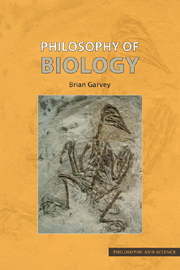Book contents
- Frontmatter
- Contents
- Acknowledgements
- Introduction
- 1 The argument in Darwin's Origin
- 2 The power of genes
- 3 Units of selection
- 4 Panglossianism and its discontents
- 5 The role of development
- 6 Nature and nurture
- 7 Function: “what it is for” versus “what it does”
- 8 Biological categories
- 9 Species and their special problems
- 10 Biology and philosophy of science
- 11 Evolution and epistemology
- 12 Evolution and religion
- 13 Evolution and human nature
- 14 Biology and ethics
- Notes
- Further reading
- Bibliography
- Index
2 - The power of genes
- Frontmatter
- Contents
- Acknowledgements
- Introduction
- 1 The argument in Darwin's Origin
- 2 The power of genes
- 3 Units of selection
- 4 Panglossianism and its discontents
- 5 The role of development
- 6 Nature and nurture
- 7 Function: “what it is for” versus “what it does”
- 8 Biological categories
- 9 Species and their special problems
- 10 Biology and philosophy of science
- 11 Evolution and epistemology
- 12 Evolution and religion
- 13 Evolution and human nature
- 14 Biology and ethics
- Notes
- Further reading
- Bibliography
- Index
Summary
In the 1970s, a new consensus emerged among evolutionists, inspired by the work of William Hamilton (1964a,b) and George Williams (1966), and ably defended and popularized by Dawkins in his book The Selfish Gene ([1976] 1989). This view retains many of the essential features of Darwin's own view as outlined in Chapter 1, and retains both the aspiration to eliminate intelligent design from the explanation of biological traits, and the claim to have successfully done so. The orthodoxy of the 1970s has two central pillars:
• Gene selectionism (or gene centrism). It holds that, in so far as the traits of organisms are designed by evolution, they are designed, not necessarily so as to benefit the organism, but so as to benefit genes.
• Adaptationism. It sees natural selection as the primary force driving the modification of traits, and therefore as the primary tool of evolutionary explanation of traits.
The former marks a departure from Darwin's own view; the latter is claimed by some to do so. Of course, what matters is not whether these views are faithful to Darwin, but whether they are true. The Hamilton-Williams view is what many people know as “the theory of evolution” from popular science and media sources. It has, apparently, become difficult for many people to conceive that there could be alternatives to this version of evolutionary theory, other than religious or crackpot-science ones.
- Type
- Chapter
- Information
- Philosophy of Biology , pp. 16 - 28Publisher: Acumen PublishingPrint publication year: 2007

